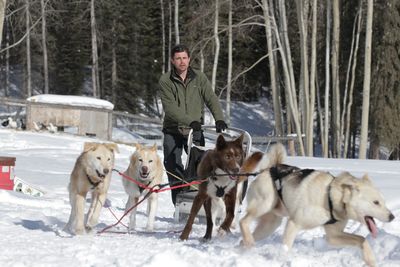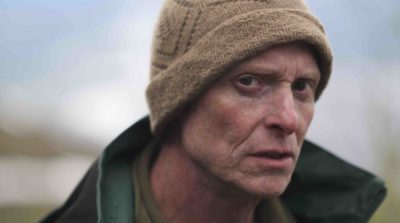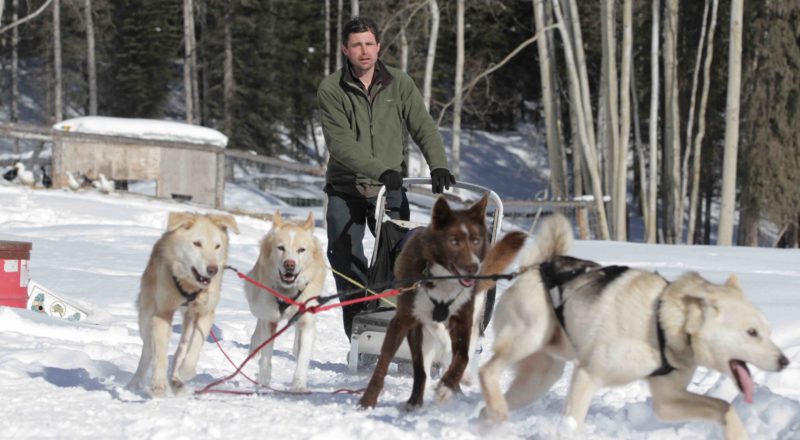INTERVIEW: Jeremy Keller finds his home on the ‘Edge of Alaska’

Edge of Alaska, the hit reality series on Discovery Channel, follows the triumphs and challenges of the small community of McCarthy, Alaska, a town far from modern conveniences and yet facing the increasing pressure of modernization and tourist traffic. On the show, which airs new episodes Sundays at 10 p.m., Jeremy Keller homesteads with his wife and children, but their original dream for McCarthy has gone through some ups and downs. It’s Keller’s mission to protect the uniqueness of the landscape around him and preserve this sense of home he first found in the late 1990s.
“I run my life based on my instincts pretty much exclusively,” Keller said recently in a phone interview. “I reserve my brain for small matters, analyzing details within bigger subjects, but life decisions, big ones, I always go with my gut. And I’ve gotten good at that over the years. It takes a lot of practice, at least it did for me, and it wasn’t my first brush up against TV shows. So it was an evolution. I had been already approached and had a lot of discussions. … And initially when that happened a few years prior to this show, I had a lot of reservations. I had a lot of no-go zones. … But those interactions started me thinking about it, and then when this came around, I went into it with pretty much just an open slate, just going to feel it out. And it just all came up spades, and I knew what that meant. So I told them what it would cost them for us to open our life to them, and they met that. It’s been great ever since.”
Keller first experienced the natural glories of McCarthy several years ago. He didn’t have a family of his own yet, and it was a “topsy-turvy” time in his life that found him hitchhiking across the United States. The journey was not a happy-go-lucky adventure, although he did enjoy his time on the road. This many years later, Keller calls his sense of self-discovery a “journey out of necessity.”
It was a time of confusion, depression and anger, what he called the “Chris McCandless syndrome,” referencing the subject of Jon Krakauer’s Into the Wild book.
“I hitchhiked into McCarthy at the end of that experience on my way somewhere else, on my way to Yellowknife, but I was only still doing that because I had no better ideas,” Keller said. “I went to McCarthy; again that was an instinct thing. I definitely received direct communication that I should go there. I had a friend there, an old friend that I knew had disappeared there, meaning that he had gone there, and I hadn’t heard from him. So my mind said, well, on my way to Yellowknife, I’ll stop in and see my friend, and when I pulled in is when my life changed. It became very obvious very quickly that I was home, whatever that meant at that time.”
What kept Keller in McCarthy was the seclusion of this small frontier town with few year-round residents. However, the seclusion wasn’t the only selling point for his relocation. He was in his late 20s at the time, and he struggled with what he called “mankind’s penchant for cruelty.”
“That’s a really big subject obviously, and it was something I couldn’t ignore,” he said. “I couldn’t make it go away. When I got to McCarthy, I felt free of it for the first time. The way I rationalized it, as I sat up on top of one of these mountains here, is I looked around me and … I said, ‘Man, there’s a lot of stone in between me and all of that, and I can feel that I’m insulated from it.’ It felt very, very good. It felt very, very free. It felt very, very safe.”
He added: “It just felt wonderful, and so I didn’t leave. I stayed a few months. I was only going to be there a day or two, but I stayed a few months. And when I did leave, I left only to go back to a place I had lived in Alaska previously to develop the resources to move in full time, and when I left that first time, I immediately went and bought the property that we now live on. And to give you an idea of how certain I was, that piece of property … that was one of the first instinctual choices I made on a large scale, a life scale, where I recognized what my intuition was telling me before I made the mistake of ignoring it. And I went and bought that piece of property sight unseen because of that feeling, and that’s where everything has unfolded. It’s a perfect and beautiful spot for us.”

Over the course of the next 15 years or so, McCarthy has changed. There is some new development interests in town, and Keller and others have criticized the vision of Neil Darish, another McCarthy resident who spoke with Hollywood Soapbox recently.
“The change-vs.-no-change discussion is very alive, and it’s been alive the entire time I’ve been here,” Keller said. “I know it’s gone through waves, and it manifests very differently in different people. I’ll tell you what, everyone shares here, even Neil to a certain degree. He’s definitely an outlier. He has a very different outlook and a very different vision, but besides Neil, I don’t know anyone that I wouldn’t say feels this way, feels this way strongly, is that they found this place, it came up magical for them in whatever way it did, it satisfied something mythic for them. And that’s a very important point. People don’t’ come to McCarthy because they were super, super happy and content where they were before, and so they fill the need. And that need they fill was based on what they found when they came, so naturally everybody wants what they found when they came to be the status quo, to be what the place will remain.”
The conundrum for residents is to satisfy that need to keep the landscape and town untouched while at the same time satisfying the need of a “personal economy,” as Keller put it.
Protection and preservation can be seen in so many different lights, and when Keller talks about the future, he can be quite poetic in figuring out the thoughts of those residents who have set up their lives in McCarthy.
“They struggle with it against the whole NIMBY [not in my backyard] idea or the gated community idea of well, we’re going to close people out now. … This is good for us, but we don’t want to share because it will ruin our experience or damage it,” he said. “But the unique thing about McCarthy is that it’s such a rugged place, and when I found it, it was still very rugged. It’s gotten easier since I got here, infrastructurally, but when I showed up, the physical boundaries were still so intense. And it’s not that they’re not intense now, but they were much more intense then that you didn’t have to have a discussion about keeping anybody out. If they could get across the rivers to get to their properties without bridges that were made for them and maintained them, then everyone felt like they earned the right. So it was a trial by fire.”
These natural barriers, including rivers that sometimes wash out manmade bridges, are a metaphor of sorts. They are set up around McCarthy as challenges for prospective residents to consider, to be challenged by and to eventually abide by. If those barriers are gone, and the tourist traffic from Denali National Park heads through downtown McCarthy, will this frontier stronghold be lost? Or, will it help the community survive?
“This should be very obvious when you look at the spread of white men across the North American continent is first the settlers went out with their covered wagons, and they found the easiest way through all the muck,” Keller said. “And then later came surveyors, and then came some road crews eventually. But here, to get to where I live, when I built my home there was no bridge across a relatively major river, and we built our own bridges. And they got washed out all the time, and sometimes they’d be out for weeks. … And the camaraderie, the community spirit that developed around those bridge-building efforts and the difficulties of it gave everyone a sense of pride in the way they lived, and it brought us all together around these hardships. These hardships were known. We chose them.”
He added: “If you build bridges for 10 years, maybe you’re not too upset about a bridge being built for you, but then what happens is now it is easy for people. Those natural boundaries are gone, and now a place can change. This is what everyone is seeing, and it’s difficult. It’s a difficult thing for people to put into perspective.”
Of course, a logical question arises when talking about Keller’s participation in Edge of Alaska. If he appreciates the seclusion and struggle of McCarthy, why invite so many people into the community via a realty series? Can this electronic communication be as intrusive as the development planned for the frontier town?
“The answer is really simple because I don’t dislike people,” he said. “I like people just fine. I wanted to put myself some place that it was hard to get to, so anyone that did come had to go through a struggle. I like those kind of people, and honestly I don’t think sharing the way that we live, the way that we parent, I don’t think the act of sharing that with even millions of people, I don’t think that draws people here. I think that just shares an experience with those people.”
By John Soltes / Publisher / John@HollywoodSoapbox.com
Edge of Alaska airs new episodes Sundays at 10 p.m. on Discovery Channel. Click here for more information.


Jeremy just admit that you are doing the show for the money. Nothing more and nothing less….and that’s okay.
Jeremy is an idiot he is so rude I hope someone punches him in the face. He didn’t do what they asked and I hope no one batters with him again he doesn’t deserve anything. That was really mean when he tore the porch off I think Neal should tear his barn down
I think the fight between don Wolcott and Jeremy about fixing the fence was staged,as a lot of fights are in the show. I love the show, but I think it already would be a good enough show without the acting in so called ‘conflicts’. Everyone can see that some conflict scenes are staged. I think the production team of edge of alaska thinks the audience is a bit retarded.
Surprised at comments of viewers. McCarthy is a
great place to live and raise a family.
Real highlight of my week watching show.
If more people do come to live in McCarthy, I hope someone opens another store! There needs to be more than one person to buy from!!!
Jeremy is a guy just like all of us were at one time. But, Jeremy, unlike most of us, found his true calling. Not only this but he made it a reality for himself and those that stay with him. A life we try to understand because through him we see our shortcomings about ourselves.
So do i understand jeremy and family moved to Knik? Did he sell the homestead?
I find it rude that some people leave nasty comments about Jeremy. The show took great liberty to add scenes and dialogue that was scripted, so understand that. Does no good to show your own poor attitude and lack of depth by attacking others. If they chose to make some money off an opportunity that was their choice, no more no less. You who have never spent time in the Wrangells, along the 60 mile road from Chitina, dealt with the hardships of choosing a life there have no idea what that calls for.